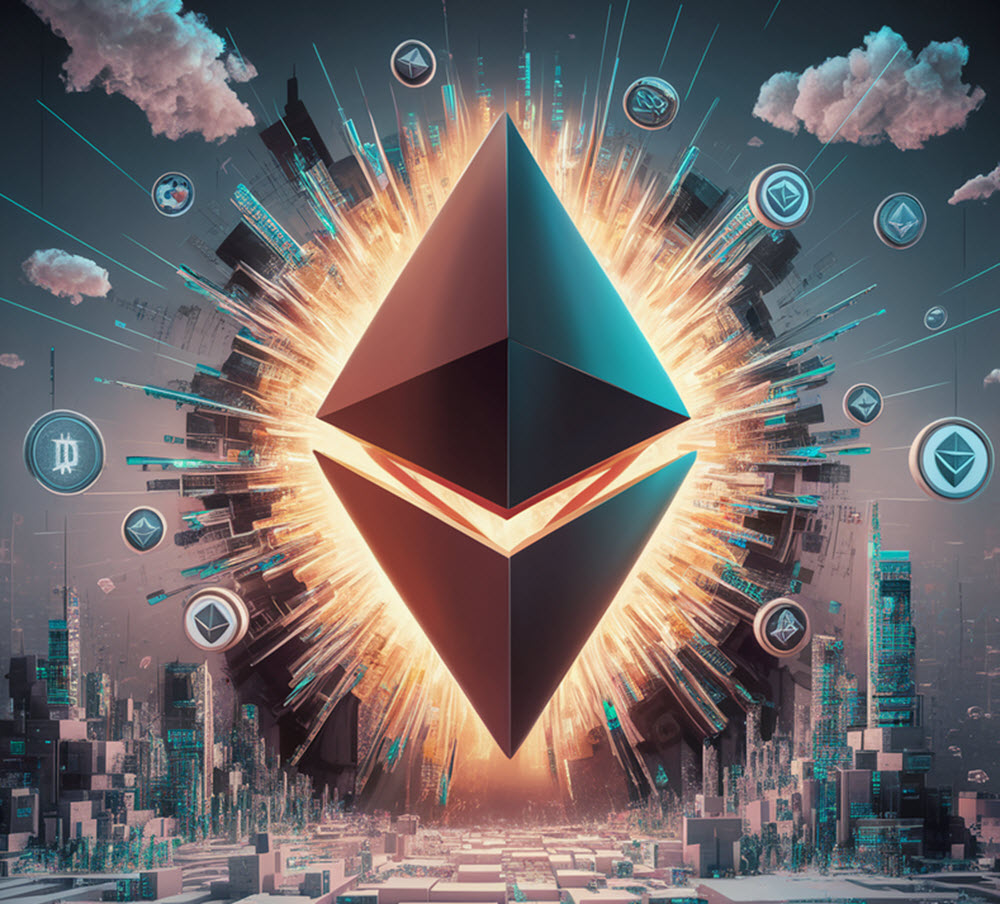Ethereum (ETH)
Warning: session_start(): open(/var/cpanel/php/sessions/ea-php83/sess_818a32c6b91619d8067385a4d0ac7551, O_RDWR) failed: Disk quota exceeded (122) in /home/infoshop/public_html/wp-content/plugins/feeder-setup/misc/geo.php on line 34
Warning: session_start(): Failed to read session data: files (path: /var/cpanel/php/sessions/ea-php83) in /home/infoshop/public_html/wp-content/plugins/feeder-setup/misc/geo.php on line 34
Contents
Understanding Ether (ETH) and Ethereum




- Ethereum is a decentralized blockchain with smart contract functionality.
- The native cryptocurrency for the Ethereum platform is Ether (ETH), which many people call Ethereum in everyday speech.
- At the time of writing (2024), Ether is the second-largest cryptocurrency by market capitalization – only Bitcoin is larger.

What is Ethereum?
Ethereum (ETH) is no mere alternative to Bitcoin (BTC), but a platform that works differently than the Bitcoin platform in several important ways.
Ethereum is an open-source, blockchain-based software platform with its digital currency, Ether (ETH). Conceptualized in 2013 by programmer Vitalik Buterin, Ethereum facilitates the creation of decentralized applications (dApps) and smart contracts with no downtime, fraud, control, or interference from a third party.
The Ethereum platform is a whole digital ecosystem. While Ether is the driving force behind the Ethereum platform, it’s the platform’s ability to support decentralized applications and smart contracts that truly sets it apart.
How Does Ethereum Work?
Ethereum operates on a blockchain network, similar to Bitcoin. However, the Ethereum blockchain is far more advanced. In Bitcoin’s blockchain, the transactions are monitored and regulated. But in Ethereum blockchain, codes for decentralized applications or smart contracts can be executed.
Being a programmable blockchain, Ethereum allows developers to build and deploy dApps on its platform. These dApps have the power to disrupt several industries, including finance, real estate, academia, insurance, healthcare, and the public sector, to name a few.
Decentralized Finance (DeFi), a concept that uses blockchain technology to remove intermediaries in financial transactions, has been largely built on Ethereum. The DeFi movement is rapidly growing, and Ethereum is at its forefront.
Critically, Ethereum is transitioning to Ethereum 2.0 or ‘Eth2’ with the aim to become more scalable, secure, and sustainable. Eth2 involves sharding to drastically increase network capacity and reduce gas costs, making it more accessible to everyday users and ensuring its potential fulfillment as the world’s decentralized computer.
Ether and Smart Contracts
Ether, the cryptocurrency of the Ethereum platform, behaves like a vehicle for moving around on the Ethereum platform and is sought by developers looking to develop and run applications inside Ethereum.
Smart contracts, on the other hand, are scripts of code that are stored on the Ethereum blockchain. They automatically execute when predetermined terms and conditions are met. This self-automated programmable functionality of Ethereum’s smart contracts is one of the primary attractions of the platform.
Background and Early History
The white paper
Ethereum was first described in a white paper published by the programmer Vitalik Buterin in 2013. Buterin is also known as one of the co-founders of the Bitcoin Magazine.
Buterin argued that blockchain technology should be used for other applications besides money transfers, but that such a blockchain needed a more robust language for application development. To this end, he developed a robust and Turing-complete programming language.
Ethereum was founded by Vitalik Buterin, Anthony Di Iorio, Charles Hoskinson, Mihai Alisie, and Amir Chetrit in December 2013. Joseph Lubin, Gavin Wood, and Jeffrey Wilcke were added in as founders in early 2014.
Announcement
Ethereum was announced at the North American Bitcoin Conference in Miamo in January 2014.
Development
Formal development of the Ethereum software began in early 2014. The company Ethereum Switzerland GmbH (EthSuisse) was founded, and so was the Swiss non-profit foundation Ethereum Foundation (Stiftung Ethereum).
From July to August, the projected brought in funding throug a crowdsale online, where people could by Ether and pay foir it using Bitcoin.
Launch
Ethereum was officially launched on 30 July, 2015, when the “Frontier” version of Ethereum went public. This is also when the genesis block was created.
The Future of Ethereum
Ethereum’s value is not just as a digital currency but also a platform that supports and encourages decentralized, secure applications’ development. With its potential to transform various sectors and its progressive developments, Ethereum rightly commands a significant position in the blockchain and cryptocurrency world.
The future of Ethereum looks promising. As Ethereum continues to lead in the DeFi and NFT (Non-Fungible Tokens) space, its value proposition is strengthening. Additionally, the successful completion of the Eth2 upgrade could be a game-changer for Ethereum, ensuring its dominance in the cryptocurrency realm.
However, like any other technology, Ethereum’s success depends on various factors, including regulatory policies, market adoption, and competition. But, with its solid use-case, technical robustness, and growing ecosystem, Ethereum is well-positioned to play a significant role in the future of decentralized applications and smart contracts.
This article was last updated on: May 19, 2024